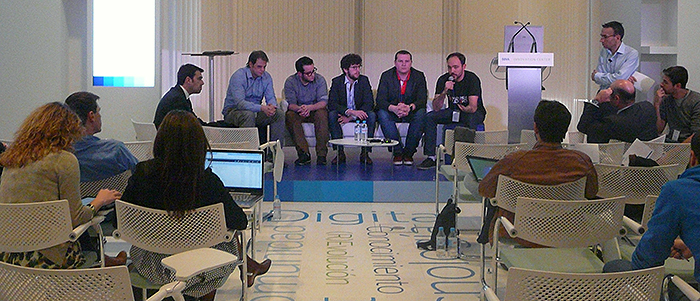The word hackathon is already part of our dictionary. If you are a developer and have some “spare time”, probably you are always thinking about creating a new app or the next hackathon in which you are going to participate. In The API Hour we’ve discovered how to make the most of these challenges, and even found some valuable clues to win them.
“To think in the future we must learn from the past”. Daniel Rojo, co-founder of Betabeers and responsible for IoT at BQ, started with this statement his conference at the The API Hour about APIs and hackathons. “We’re supposed to be unsociable guys, but we create communities out of nowhere and build intellectual constructions together,” he said. And here is where hackathons play a crucial role: transporting good ideas to all sectors through these events and technological talks, such as those organized by Betabeers.
Marian Moldovan, a seasoned participant in hackathons and member of the Department of Innovation of Beeva, shares the same view and assures that these competitions are “a sport for hackers”, a “collaborative and social sport” where you compete but also learn and socialize.
In these competitions, 30% of the participants are usually entrepreneurs aiming to implement some of their ideas, but 70% are just “curious about technology.” However, Rojo stresses that ideas for startups may arise from both groups, not only among entrepreneurs.
Adolfo Sanz, founder of Hackathon Lovers, recommends all participants to take that day “off” and just concentrate on teaching and learning new things. “All the things I’ve been learning as a developer I’ve learnt them at hackathons, using my time not only to learn but also to teach other hackers, whether they are or not of our team.”
But what are the steps we should take to win one of the many hackathons out there today? Moldovan and Sanz share with us some of the clues we should follow, but making it clear that they can’t be taken as “a self-help book”.
Who: team
At a hackathon you always need to have a team, because teamwork is a key element when the goal is to create an app in such a short time. Moldovan advises to create it “with different and varied profiles that complement each other.” In this sense, Sanz highlights the multidisciplinary character required by teams, as it is a way to encourage networking between areas. “Get together with people who are not developers, who know about design or business.”
What: idea
Very important, because this is what will differentiate you from others. “It’s important to be original, but also to understand what they are asking for and do something clever with the requirements,” says Moldovan.
Adolfo Sanz always suggests brainstorming sessions: “Ideas are not your ‘treasure’, you have to share them.” Therefore, even though you may be afraid of having your ideas stolen, he believes that it is always “better to take that risk than not sharing them and keeping them just for you.”
An important advice: “Don’t think about designing the Death Star; you have to do something simple within complexity”.
How: development
During the app’s development phase, both experts insist on “keeping it simple”: do things intelligently – create simple tools for complex applications. It is therefore essential to use third-party APIs and control their latest versions in order to keep track of their progress.
The key to finish on schedule is to plan and organize well the time you have in order to reach all phases. Therefore, Sanz recommends to divide tasks always keeping in mind these four cornerstones: backend, frontend, design and business. “If you can have one person fore each item, the better. But there will be times when one person will have to deal with two of them, if teams are of three people…”
Wow: presentation
“Any sufficiently advanced technology is indistinguishable from magic.” With this quote from Arthur C. Clarke, Moldovan stresses the importance of this step. “We are visual beings; you have to show and submit your demo properly”.
Both experts advice to be ready for the “demo effect”: you have to have a plan B, because “the Internet or your HDMI cable might not work.” Another option B can be to prepare an elevator pitch, but in a more specific way (1, 2 and technology). During the presentation, “try to connect with the public telling a joke,” recommends Sanz.
“Almost everything I’ve learned is from losing hackathons; you learn from failures. Winning is great, but losing is extremely didactic. Experiment, fail, learn and repeat to infinity”, was Moldovan’s closing advice to the audience. Sanz also recommended “to learn, to network and, above all, have fun and enjoy!”
Collaboration: systems and open innovation
The most repeated recommendation during this debate was to use third-party APIs to develop a project. “There are a lot of open APIs, and most of them are free, at least for the initial requests”.
Open source systems are the ones that have caused a revolution in the technology world, as “now any project can grow; it doesn’t stagnate and does not clash with closed environments thanks to APIs. You don’t need to learn the whole system, just the API”, said Rojo.
“Linux has changed the world, but in the open source communities we have a problem: we communicate poorly”. The example is that Linux is everywhere, and most people don’t even know that Android is Linux.
This spirit of collaboration was precisely demanded during the morning session of The API Hour focused on the world of fintech. The co-founder of Digital Origin, Marta Plana, stressed that traditional banks, who have been working many years in the financial world and have a lot of experience, “need to understand that there is a digital revolution, and we’re moving towards digital banking.”
Philippe Gelis, CEO of Kantox, explained at this point how the future “fintech bank” experience will be against the current traditional bank, with APIs will play a starring role.
“Being a fintech bank the user will have the same services he has at a traditional bank today, although some of these services will be offered by third parties via APIs. For the user it will be a complete experience within the same fintech bank,” he explained.
If you are interested in the world of APIs, find out more about BBVA’s APIs here.


























